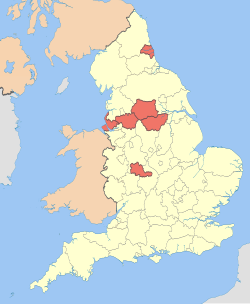Metropolitan county
| Metropolitan county | |
|---|---|

|
|
| category | Counties |
| Part of the country | England |
| Administrative head unit | Regions |
| founding | Local Government Act 1972 |
| Establishment date | April 1, 1974 |
| number | 6 (since 2008) |
| Additional status | Ceremonial county |
| population | 1.2-2.8 million |
| Administrative subunit | Metropolitan District |
A metropolitan county is a type of administrative unit in England introduced in 1974 . Its establishment took account of the fact that the metropolitan areas created during the Industrial Revolution overlay traditional county boundaries . In 1986, under Margaret Thatcher, the councils of the Metropolitan Counties were abolished because they were bastions of the Labor Party . Their competencies have been delegated to the subdivided Metropolitan Boroughs . However, the Metropolitan Counties continue to exist as administrative and statistical units. There are six metropolitan counties:
| Surname | Population (2014) |
Area (in km²) |
Metropolitan Boroughs |
|---|---|---|---|
| Greater Manchester | 2,732,854 | 1276 | Manchester , Bolton , Bury , Oldham , Rochdale , Salford , Stockport , Tameside , Trafford , Wigan |
| Merseyside | 1,391,113 | 645 | Liverpool , Knowsley , Sefton , St Helens , Wirral |
| South Yorkshire | 1,365,847 | 1552 | Sheffield , Barnsley , Doncaster , Rotherham |
| Tyne and Wear | 1,118,713 | 540 | Newcastle-upon-Tyne , Gateshead , South Tyneside , North Tyneside , Sunderland |
| West Midlands | 2,808,356 | 902 | Birmingham , Coventry , Dudley , Sandwell , Solihull , Walsall , Wolverhampton |
| West Yorkshire | 2,264,329 | 2209 | Leeds , Bradford , Calderdale , Kirklees , Wakefield |
Even Greater London is sometimes referred to as a metropolitan county though this county has a different task and definition.
In addition to the Metropolitan Counties, there are also the Non-Metropolitan Counties , which are subdivided into Non-Metropolitan Districts .